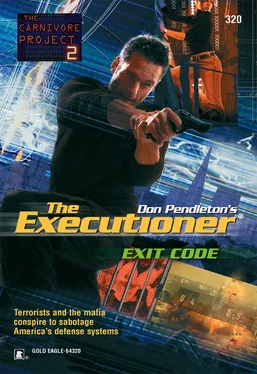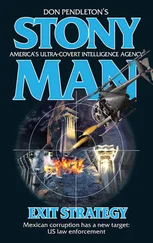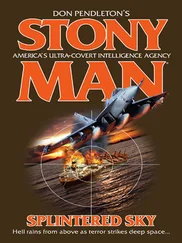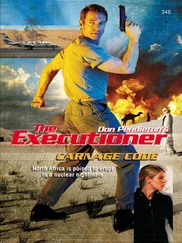Don Pendleton - Exit Code
Здесь есть возможность читать онлайн «Don Pendleton - Exit Code» — ознакомительный отрывок электронной книги совершенно бесплатно, а после прочтения отрывка купить полную версию. В некоторых случаях можно слушать аудио, скачать через торрент в формате fb2 и присутствует краткое содержание. Жанр: unrecognised, на английском языке. Описание произведения, (предисловие) а так же отзывы посетителей доступны на портале библиотеки ЛибКат.
- Название:Exit Code
- Автор:
- Жанр:
- Год:неизвестен
- ISBN:нет данных
- Рейтинг книги:3 / 5. Голосов: 1
-
Избранное:Добавить в избранное
- Отзывы:
-
Ваша оценка:
- 60
- 1
- 2
- 3
- 4
- 5
Exit Code: краткое содержание, описание и аннотация
Предлагаем к чтению аннотацию, описание, краткое содержание или предисловие (зависит от того, что написал сам автор книги «Exit Code»). Если вы не нашли необходимую информацию о книге — напишите в комментариях, мы постараемся отыскать её.
Exit Code — читать онлайн ознакомительный отрывок
Ниже представлен текст книги, разбитый по страницам. Система сохранения места последней прочитанной страницы, позволяет с удобством читать онлайн бесплатно книгу «Exit Code», без необходимости каждый раз заново искать на чём Вы остановились. Поставьте закладку, и сможете в любой момент перейти на страницу, на которой закончили чтение.
Интервал:
Закладка:
“Like a profile?” Brognola asked.
“Sort of, but it’s a bit more complicated than that. We do build a profile on them, without a doubt, but there are telltale signs they leave behind, and no two are alike. You could call it the electronic version of a fingerprint. Maybe it’s the particular system or combination of systems they use to build their infrastructure, maybe it’s their methods of programming. Whatever it is, we can hit upon it and expand the profile at an exponential rate. And if we can actually tie this information to the identity of that individual, just like we did with Rhatib, we’re one step closer to closing the holes in all of our information and defense systems.”
“But for the time being,” Price said to Bolan, “we need you to put an end to Lenzini’s operations. Basically, we need you to buy Stony Man some time.”
Bolan shrugged. “The only way for me to do that is to get a clearer understanding of how Lenzini’s work ties to the NIF. What’s the motivation here?”
“That’s what we don’t know,” Brognola said, cutting in. “What we can tell you is that Lenzini set up this network to get Rhatib access to specific areas, most of them defensive operational systems and defense networks belonging to the Defense Department.”
“Something’s wrong here,” Price said. “Why would the NIF go after defensive systems? You’d think they would want to get their hands on offensive weaponry, particularly nuclear or chemical.”
“That’s just what I was thinking as well,” Bolan said. “Unless they plan to launch some type of major offensive and use Carnivore to shut down defensive systems. That would render us vulnerable to just about any attack.”
“Precisely,” Kurtzman added.
“Your friend, Tyra MacEwan, was the one who really helped us to see how this works,” Price said. “She possessed key knowledge we didn’t have. About four years ago, the Defense Advanced Research Projects Agency started a program called the Next Generation Internet, or NGI, which they nicknamed SuperNet. The funding was sanctioned at the highest levels within the Oval Office and the Pentagon, and plans started immediately for its design, engineering and ultimately its implementation.” She smiled and then looked at Kurtzman. “But I’ll let Bear get into the technical details.”
“MacEwan wasn’t real anxious to give up the information during her debriefing,” Kurtzman said. “But I think she trusts you,” he said to Bolan.
Bolan nodded in understanding. He couldn’t really fault the woman for her reticence. Tyra MacEwan was patriotic, passionate and highly intelligent. Shortly after her appointment to DARPA, she was brought into the FBI on a joint special technology services project to work with Dr. Mitchell Fowler, a respected scientist for the FBI who wasn’t the least bit shy about verbalizing his reservations regarding the security of Carnivore. Fowler’s death from a sniper’s bullet had triggered the events of the past few days, and had nearly cost Bolan, Jack Grimaldi and Tyra MacEwan their lives.
“The concepts behind the NGI are pretty high-level still,” Kurtzman continued, “but there are a good number of technologies already in place to support it. First is the idea of multispectral sensors, such as radar and SAR, infrared and microwave. This would be used to increase bandwidth into the multi-TBPS level,” he said.
“Could you give that to me again?” Bolan asked.
“Sorry. TBPS is terabytes per second.”
Bolan nodded and then waved at him to continue.
“There’s also the engineering side of this thing, Striker.” Kurtzman tapped a key and the display showed a small, rectangular object—some sort of electronic chip—with a micrometer ruler above it that demonstrated the object was only three-quarters of a millimeter wide and less than one-tenth of a millimeter high. “This is a prototype of a laser array transmitter than can pass transmissions at two hundred gigabytes per second or faster.”
“God help us,” Brognola said, immediately followed by a sigh that told Bolan he was stunned by Kurtzman’s revelation.
Bolan had to admit that he could hardly believe it himself. “Where’s the project at right now, Bear?”
“Well, they’re telling the Senate appropriations committees that they’re a lot farther away from a fully functional system prototype than MacEwan thinks they are. She’s not sure why they’re hiding this information.”
“Okay, let me see if I can piece some of this together,” Brognola said. “The NIF recruits Rhatib to break into the DOD’s defensive electronic system, using Carnivore as a sort of gateway. The NIF contracts local help from Lenzini, probably for funding and to keep their cells inside the country, while Rhatib starts working the technical angles. And we’re exploring the possibility that the NIF has enough inside supporters to utilize this SuperNet program to control our defensive network? Seems a bit ambitious for a small terrorist group. Plus, I can’t see us giving them that kind of support.”
“I don’t think most Americans would, Hal,” Bolan said. “But it’s possible they’re doing it unwittingly.”
“What do you mean?” Brognola asked.
“Well, I’d imagine that most of the participants in this SuperNet program are either government contractors or very large corporations conducting business transactions worldwide on a daily basis. Right, Bear?” Bolan looked at the man for confirmation.
Kurtzman nodded emphatically.
“So it only takes one traitor inside a company to turn things around,” Bolan said.
“Right,” Kurtzman interjected. “All they need to do, really, is provide networking information to an outside source. They can leak enough that any good hacker could take it from there. Plus, Carnivore is virtually undetectable to those security systems. The FBI monitors information constantly across the Internet. It wouldn’t be any surprise to see the Carnivore fingerprints on everything. In most cases, companies will be apathetic about this because after all, it’s the federal government, and they have to do that to protect us from terrorism. Who’s really going to question it?”
“Nobody,” Bolan said. “And you’re right in thinking the NIF’s going to use that to their advantage.”
“I spoke with the President about the situation before you returned, Striker,” Brognola said. “He’s refusing to let us simply shut down Carnivore. He thinks now that we have Rhatib in custody, and MacEwan and Bear have things well in hand in closing the remaining security holes in Carnivore, that Lenzini’s the biggest threat.”
“In this case, I think the Man and I agree,” Bolan said, surprised even as he heard the words come out of his own mouth.
Over the years Bolan’s alliance with his government had been tedious and shaky at best. Some of the previous occupants of the Oval Office had supported his work, while others used him only when deeming it absolutely necessary. Bolan couldn’t deal with the bureaucracies. He was allowed to operate on his own, pursue whatever missions he chose, but he did so on his own and without the support of the very people he worked to protect.
Nonetheless, that deal was okay with Bolan. He wished there could have been a better relationship with his government, but Bolan understood that Uncle Sam had to operate by his rules, just as the warrior had his own. Though the relationship was tense at times, it wasn’t unfriendly. And Brognola would lend the support and expertise of any member within Stony Man whenever it was needed. That was enough for the Executioner, and it was actually his preference. He was always cognizant that Brognola pushed the envelope when he rendered assistance on missions outside the approval of the Oval Office, and Bolan was vigilant in insuring that support didn’t compromise Stony Man’s security.
Читать дальшеИнтервал:
Закладка:
Похожие книги на «Exit Code»
Представляем Вашему вниманию похожие книги на «Exit Code» списком для выбора. Мы отобрали схожую по названию и смыслу литературу в надежде предоставить читателям больше вариантов отыскать новые, интересные, ещё непрочитанные произведения.
Обсуждение, отзывы о книге «Exit Code» и просто собственные мнения читателей. Оставьте ваши комментарии, напишите, что Вы думаете о произведении, его смысле или главных героях. Укажите что конкретно понравилось, а что нет, и почему Вы так считаете.












